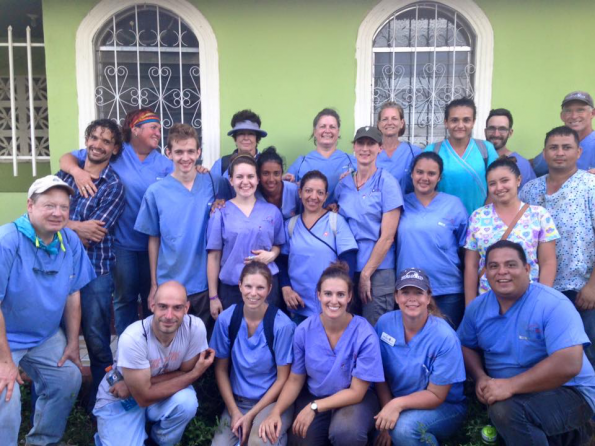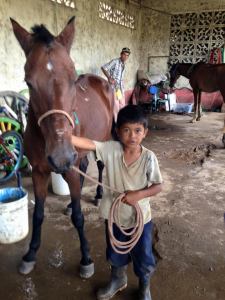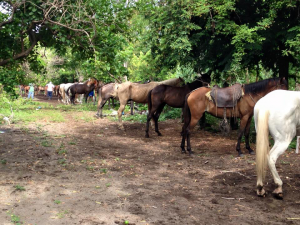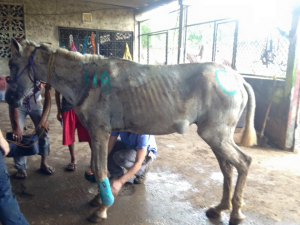
One thing I am enjoying now that I have a little more time is international veterinary volunteer trips. After I returned from my second trip to Nicaragua with World Vets (http://worldvets.org) my Maple Springs family asked if I would write an article about it.
Where to start? It has truly been a transformative experience for me, and I expect to be going back every year for this trip, and maybe more if more trips get planned. It is a little bit addictive! First, the nuts and bolts. World Vets is a U.S. nonprofit organization that conducts trips all over the world to provide badly needed veterinary care and services where care is lacking. Most of these trips are for dogs and cats, but a few involve care of livestock and in particular working horses. The vast majority of working horses in the world receive no veterinary care during their lives.
One of these is a well-established annual week-long trip to Granada, Nicaragua where a wonderful working relationship has formed between the local veterinarians and World Vets. Granada is a lovely colonial city about an hour from the capital of Managua. World Vets maintains a spay-neuter clinic there which serves as the home base from which the team works on the horses in the area. The horses in this area are mostly small (13-15 hands) and derived from Spanish breeds. They mostly work as cart horses, pulling heavy wooden carts and wagons in harness made from whatever the farmers can get, including rope, string, chain, electrical cord, and rubber hose. They haul water, supplies, people and whatever is needed to be transported. They are the main mode of transport for the local farmers other than oxen.
How do you get involved in one of these trips? You just sign up on the website! Anyone can go—each trip has a certain number of openings for veterinarians, veterinary technicians, and assistants. Assistants are not required to have any veterinary, horse or medical experience at all—just a desire to help and get involved! I am not an equine veterinarian although I have had my own horses for years, and did practice a bit of equine medicine earlier in my career. Spanish speaking is not required for this trip either, although it is very helpful. The team is about twelve people altogether, including a trip director who is experienced in these trips and equine medicine. Joining the team are some of the local veterinarians working with World Vets, and wonderful Nicaraguan veterinary students eager to learn what they can about caring for and working with horses.
Each day the team went to a prearranged different area around Granada so that the local people know where to go. We went to barrios and worked in open fields, the parking lot of the local baseball stadium, farms outside town and even in a street alley where the town’s coach horses started out every morning. Every morning when we arrived there were around a hundred or so horses lined up, in the heat, with no water, often no shade, and with just a string around their neck brought by a small child whose parents had to work. The people and horses waited patiently for hours for their turn. Many had walked miles to get there, and had to walk miles to get back home, even after being anesthetized for castration or sedated for dental work.
It can be a culture shock to see the living conditions for the horses and for that matter, the people. Extreme poverty is common—the horses have so little to live on that they are starving and emaciated. But they are critical to the livelihoods of their owners so they must keep working. This is not cruelty or abuse–owners barely have enough to feed their own families and children. They do the best they can with what little they have.
As veterinarians we judge body condition of animals on a 1-9 scale, with 1 being poor condition, emaciated with no body fat, and 9 being extremely fat. A score of 5 is appropriate for most horses. Here in Maryland, the typical well cared for horse is usually around 6-7. The vast majority of the horses we treated on both of my trips to Nicaragua had a body condition score of 1 or 2. Because of their complete lack of body fat they frequently had chronic harness and saddle sores. Their ears and tails were also commonly infested with ticks, and light colored horses frequently had chronic and severe sunburn.
We provided parasite treatments (Ivermectin and Fipronil), vitamins, rabies and Venezuelan Equine Encephalitis (VEE) vaccines, wound treatment, foot care, dental floating, castrations. Drugs used to sedate, anesthetize and provide pain relief or antibiotics to horses as needed included xylazine, medetomidine, ketamine, phenylbutazone, Banamine and penicillin. Last year we performed an eye enucleation on a cart horse with a painful infected blind eye—in a parking lot. Owners were each provided an animal “passport” to have a record of what was performed and to keep it updated if they return year to year. Over the course of the week we were able to treat around 400 horses.
During each trip I have had a whirlwind of emotions. It is exhilarating to feel you are contributing in even a very small way to such a worthy cause. I found it interesting to see many different conditions not normally seen in healthy horses here in the US, and to be able to do procedures I don’t do here at home—gelding horses, floating teeth and trimming feet. Working with the team of local students and vets, and caring compassionate people from around the world is incredibly gratifying. But is the hardest work I have ever done, and I have never been so dirty, exhausted, sweaty and grimy in my life. And most of all, I had moments where all I could do was take a moment for myself to cry at some of the saddest cases I saw. But then I got back to work—there were more horses to see. 
Those who have done this for a lot longer than I have told me that the toughest and saddest cases are exactly why we go—if we didn’t then they would have no care at all, and helping even one horse even just a little bit, is important, especially for that animal. Slowly, over time, by establishing relationships with the local people, care can and does improve the conditions for these extremely hard working little horses. Now that I have gone twice, seen first hand the conditions for these horses and knowing how much they need the most basic care, it is hard to imagine not going back every year I think the work that World Vets is doing is so important, and I hope to be a part of it for a long time. But anyone can go, so if you have ever thought you might be interested in such work, I encourage you to consider going or contributing however you can. I am happy to talk with anyone who wants to know more details about the trip. And hug your animals extra tight next time you see them! Remember how lucky they are to be well fed, cared for and loved.
~Dr. Harvey










